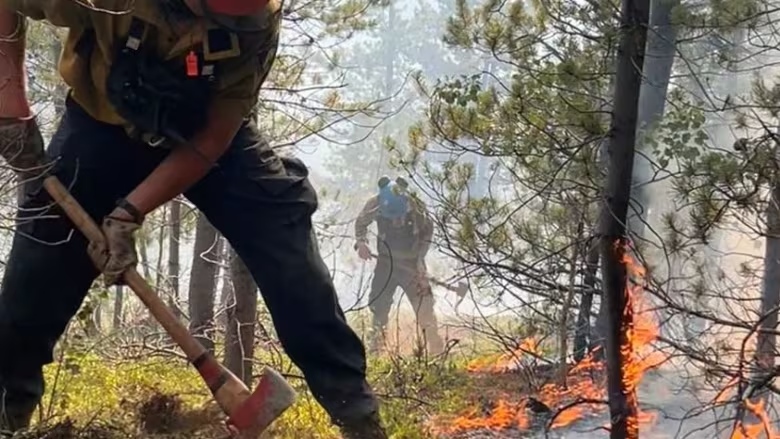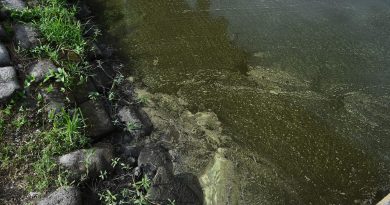Yukon’s wildfire season ‘escalated dramatically’ over last week, with 80 new starts

Territory requesting firefighting help from elsewhere, but officials say resources stretched thin everywhere
The Yukon’s wildfire season has taken a turn for the worse in recent days, according to emergency officials, with 80 new fires sparked in the last week.
And with more lightning expected in the coming days, officials are bracing for still more — while preparing for the possibility that there’s no available firefighting help from outside the territory.
“This territory’s wildfire season has escalated dramatically in the recent days, due to lightning activity,” said Mike Fancie, Yukon’s fire information officer, at a briefing on Monday afternoon.
More than half of those new fires — 42 — are in the Dawson fire district, and 20 are in the Old Crow district.
No Yukon communities are currently at risk, officials said. There are still three evacuation alerts in place, for the Dublin Gulch area near Keno City, the Sixtymile area south of Top of the World Highway, and from kilometres 10 to 35 of the Silver Trail.
On Sunday, the Eagle Gold mine site was evacuated on the recommendation of emergency officials. The East McQuesten River fire is now about four kilometres from the mine site, Fancie said.
Some workers have since been allowed back to the mine site to perform “critical functions,” though they must be able to clear out again within 60 minutes if needed.
Resources stretched thin
As of Monday, there were 96 active wildfires across the territory. Fancie said 12 of those were receiving a full response — with attack crews trying to contain and extinguish the fire — and seven more were receiving a modified response, where the focus is more on protecting property and infrastructure.
It’s all stretched the territory’s resources thin, and that has emergency officials anxious about the weather in the coming days.
“We certainly need more initial attack resources, just because we expect more lightning to take place,” Fancie said.

The territory has already been scrounging for additional helicopters. Other government departments and local helicopter companies have helped out as much as they can, Fancie says, but the shortage has made firefighting more “challenging” — particularly in remote areas of central and northern Yukon.
“We’ve been making progress securing more helicopters. However, last week a lack of helicopters did hamper our response to attack some fires,” Fancie said.
“We require these different types of resources in order to be successful in our job and last week we were short in rotary-wing resources.”
A crew of 20 Nova Scotia firefighters that arrived earlier this month to help in Yukon has now gone home. Community Services Minister Richard Mostyn said Monday that he was “surprised and delighted” that they were able to come, and said they did amazing work — but now they’re getting some much-needed rest.
Mostyn said the territory is again asking for more help from other jurisdictions — but he cautions that help may simply not be available.
“The entire country is swaddled in smoke and fire and it is taxing the firefighter resources of every jurisdiction in the country,” Mostyn said.
“In former years at this time in the season, there might be lots of crews all over the country sitting idle and ready to come on board. But this year there’s nothing. Like, there’s very, very little. We are all working flat-out in this nation, to try to keep a handle on this unprecedented fire situation.”
He said Yukon officials should know in the coming days whether there are any extra resources available within Canada or beyond.
In the meantime, Fancie said firefighters “will do everything that we can with the resources that we have.”
“We are going to request the resources that we need, see what comes from that request, and then make an assessment about how to address the situation.”
Related stories from around the North:
Canada: Fire services have returned to Pelly Crossing, Yukon, after a decade without, CBC News
Norway: Smoke from Canadian wildfires forecast to reach Norway, The Associated Press
Russia: New NOAA report finds vast Siberian wildfires linked to Arctic warming, The Associated Press
Sweden: Fire bans in force across large parts of Sweden, Radio Sweden
United States: Wildfires in Anchorage? Climate change sparks disaster fears, The Associated Press



